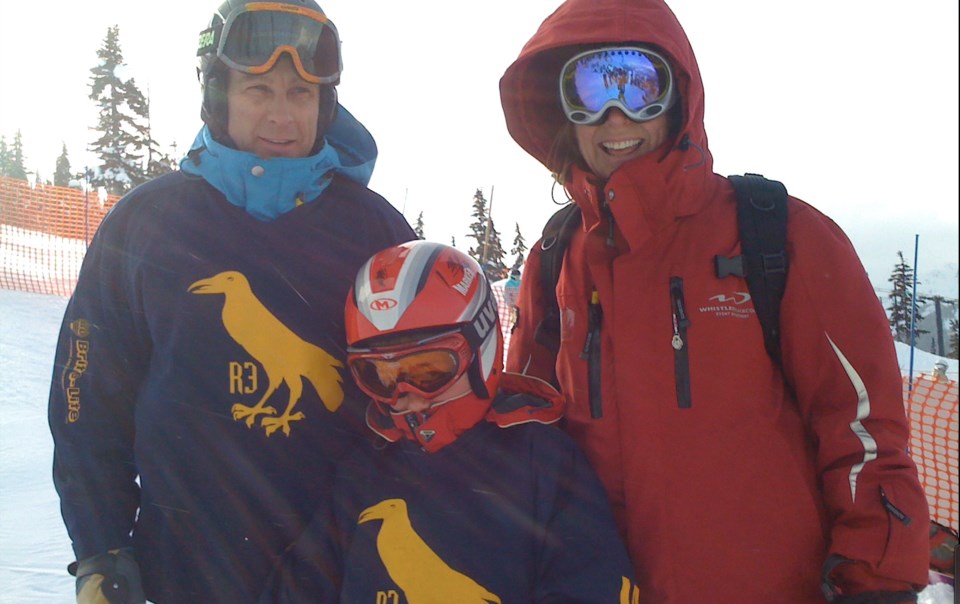Unless you have kids who have gone through Whistler Blackcomb’s ski programs, or you grew up here and went through the lessons yourself, you might not know who Denis Ebacher is.
But that doesn’t mean his impact on Whistler’s ski community hasn’t been huge.
For the past 30 years, Ebacher has been the man behind the mountain’s J4 program, which taught kids aged 10 years old the fundamentals of skiing before they picked their competitive path.
But now, more than three decades later, Ebacher is leaving Whistler and heading back home to Quebec in July to be closer to his family.
“My mom is getting older. She’s still in great shape and she’s got a pretty good relationship with my daughter, and I want them to benefit from that a little bit more than just Skyping all the time,” he said. “We also want my daughter to experience a different lifestyle than the Whistler bubble that we live in. She was born and raised here, so she’s a real Whistler kid. And if we wait too long, then home is going to be here for her, and I want her to feel like she has another home too.
“But it’s bittersweet, for sure … I spent more than half my life here, but we’re excited for the new adventure, the new life and to be close to family.”
In a town like Whistler, it’s no surprise that of the hundreds of kids to go through Ebacher’s programs over the years, many would go on to have great ski careers. Some, like Mike Janyk, Mollie Jepsen, and Broderick Thompson, just to name a few, even competed on the sport’s highest stages—the Olympic and Paralympic Games.
While Ebacher doesn’t want any credit for the success his former students have had, as he believes the ones who made it would have made it regardless of coaching, for both Janyk and Jepsen, Ebacher’s impact on their careers won’t soon be forgotten.
Now 22 years old with six Paralympic medals already under her belt, Jepsen distinctly remembers Ebacher giving her confidence in her abilities and urging her to take up ski racing.
“He pulled me aside out of the group one day and was like, ‘hey, I think you are a really good skier; I think you should try this,’ and so we ended up just me and him doing a little bit of light gate training,” said Jepsen. “This would have probably been the first gates I actually ever skied around, and I think it’s probably the reason that I did pursue ski racing in the end, which is kind of a cool thing to think about. He just gave me my foundation in ski racing and made me feel like it was possible for me to be in ski racing.”
Similarly, for Janyk, a three-time Olympian and the current executive director of the Whistler Mountain Ski Club, his memories of Ebacher are of someone who matched the energy of a rambunctious group of kids and helped stoke their fire for skiing.
“He was my first contact with an organized ski program, and I remember he just had this energy that matched ours. He knew how to push us, challenge us and give us structure to keep us in line, too. And it was like everything I hoped it could be,” said Janyk. “He was the first one who pushed us to do 360s, to jump cliffs, but also pairing that with the fundamental skill development it really nurtured and fostered that love for the whole sport and for a work ethic with it.”
While he is extremely proud of everything his former students have accomplished in the sport, for Ebacher, getting results or moving up the ranks was never a focus of his teachings.
Instead, his lessons revolved building a love for the sport that would last a lifetime. And he believed that all started with respect: respect for the rules, respect for the mountain and respect for each other.
“We had a bunch of rules … and if they did something wrong, then they would have to do pushups. But the thing is, those rules apply to the coaches as well. So I think it created that team spirit that even the coach wasn’t above all these rules. I guess it made them feel that I respected them for who they were, and not because they’re little kids they owe me respect, I had to earn it, too. And I think that made that connection that much stronger,” he said.
“I’ve always focused on trying to make lifetime skiers more than anything else. I think the thing I’m most proud of is just when I see kids that I coached like 32 years ago, skiing with their family up here and having their own kids in our program. That’s how [I know] we reached our goal, we got some lifelong skiers.”
Ebacher actually stepped away from his role as a coach last year, opting to work for the mountain as a groomer this season instead.
And while the mountain’s U10 and U12 ski programs will be in good hands with replacement Ian Stirk, after 30 plus years in the business, there is bound to be some advice Ebacher can pass down to his successors.
When asked about that advice, Ebacher said to focus on the kids. Because, even though their parents might be the ones paying, the kids are the real customers.
“I have some parents in the past that have tried to tell me what to do and, you know, I’m French Canadian and I’m very stubborn and unless you can prove I’m wrong, I’m not going to change the way I do things,” he said. “And so my answer to their request was, ‘is your kid happy to be skiing every weekend?’ Yes? OK, then he’s my customer. I know you’re paying, but if he’s happy, I think we’re doing the right thing.”




